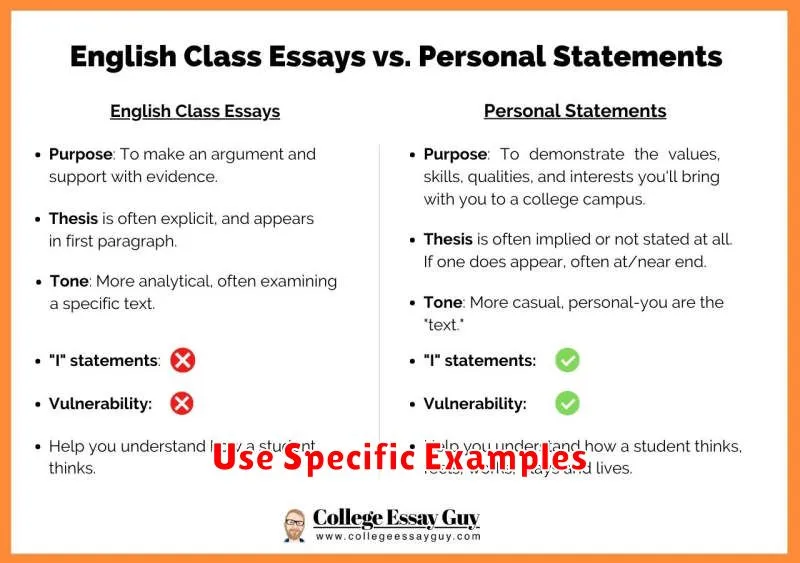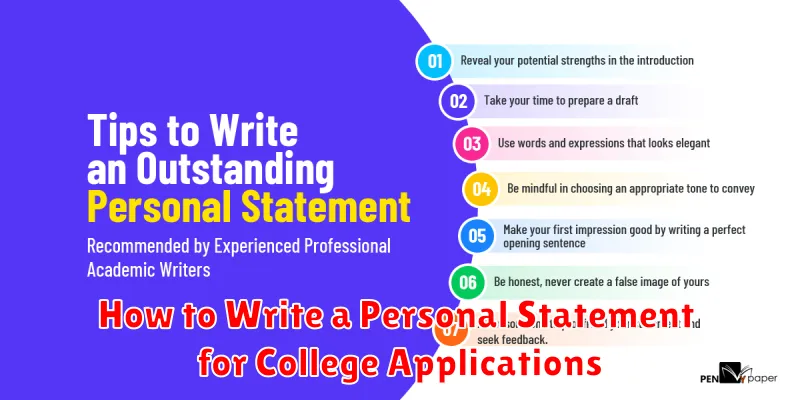Crafting a compelling personal statement is a pivotal step in the college application process. This crucial document provides a unique opportunity to showcase your personality, experiences, and aspirations to admissions committees. A well-written personal statement can distinguish you from other applicants with similar academic profiles. Learn how to write a personal statement that effectively communicates your strengths, demonstrates your writing ability, and ultimately increases your chances of acceptance into your dream school. This guide will equip you with the knowledge and tools necessary to navigate the often daunting task of personal statement writing.
This comprehensive guide will delve into the essential elements of a successful personal statement. We will explore strategies for brainstorming compelling topics, structuring your narrative effectively, and crafting prose that resonates with admissions officers. From understanding the purpose of the personal statement to polishing your final draft, this resource offers valuable insights and practical advice for creating a personal statement that truly represents you. Prepare to embark on the journey of transforming your experiences and aspirations into a powerful and persuasive narrative that will capture the attention of college admissions committees.
Understand the Prompt
Before you begin writing, carefully read and dissect the prompt. Understanding the question is paramount to crafting a compelling response. Identify the key themes and keywords. What are they asking you to address? Is it your biggest influence, a significant challenge, or your aspirations? A clear grasp of the prompt ensures your essay stays focused and relevant.
Colleges use personal statements to get to know you beyond your grades and test scores. They want to see your personality, values, and experiences shine through. By understanding the prompt, you can effectively tailor your narrative to showcase these qualities in a way that directly answers the question.
Start with a Strong Hook
Your personal statement’s opening sentence is crucial. It needs to grab the reader’s attention and make them want to read more. A compelling hook can be a thought-provoking question, a surprising anecdote, or a bold statement.
Avoid clichés and generic introductions. Focus on something unique to you. This is your chance to make a strong first impression and set the tone for the rest of your essay. Think about what you want the admissions committee to remember about you after reading your first sentence.
Highlight Your Achievements
This section is crucial for showcasing your capabilities. Focus on experiences and accomplishments that demonstrate your strengths, skills, and passions. Quantify your achievements whenever possible to give them more impact.
For example, instead of saying “I improved the school’s recycling program,” try “I increased student recycling participation by 30% by implementing a new incentive program.” Numbers and specifics add weight to your claims.
Consider achievements from all areas of your life—academics, extracurriculars, volunteer work, personal projects, and even work experience. Select those most relevant to your intended major or career path and those that best reflect your character and potential.
Showcase Personality and Values
A compelling personal statement reveals who you are beyond grades and test scores. It’s a chance to showcase your unique personality and core values. Let your authentic self shine through. Don’t try to be someone you’re not. Admissions committees seek genuine individuals who will contribute positively to their campus community.
Reflect on experiences that have shaped you. What are you passionate about? What challenges have you overcome? Highlight values such as resilience, determination, empathy, or creativity through specific anecdotes. These stories make your application memorable.
Stay Authentic and Honest
Authenticity is crucial in your personal statement. Admissions committees read thousands of applications. A genuine voice stands out. Don’t try to be someone you’re not. Write about your real experiences, genuine passions, and honest reflections.
Avoid exaggerating or fabricating details. Focus on showcasing your unique personality and perspective. Your sincerity will resonate with the reader and make your application more memorable.
Use Specific Examples

Specificity strengthens your personal statement. Instead of claiming you’re a “hard worker,” describe a time you dedicated extra hours to a challenging project and the positive outcome. Don’t just say you’re “passionate about science”—relate a specific experience that ignited this passion, such as a captivating experiment or a science fair project.
Quantify your achievements whenever possible. Rather than stating you improved your grades, mention you raised your GPA from a 3.0 to a 3.8. Using concrete examples and data makes your narrative more compelling and believable to admissions committees.
Keep It Focused and Structured
A focused personal statement directly addresses the prompt, highlighting relevant experiences and skills. Avoid meandering or including irrelevant information. Structure is crucial for clarity. A logical flow makes your narrative easy to follow and understand.
Organize your statement with a clear beginning, middle, and end. Introduce yourself and your central theme concisely. Develop your narrative with specific examples and supporting details. Conclude by reiterating your key message and expressing your enthusiasm.
Edit and Get Feedback
After drafting your personal statement, the editing process is crucial. Thoroughly review your essay for grammar, spelling, punctuation, and clarity. Ensure your statement flows logically and effectively conveys your message.
Seeking feedback is essential. Ask teachers, counselors, or trusted mentors to read your statement. Their perspective can help identify areas for improvement and ensure your essay resonates with the admissions committee.
Follow the Word Limit
Adhering to the specified word limit is crucial. Admissions committees have many applications to review, and exceeding the limit demonstrates a lack of respect for their time and guidelines.
Most applications specify a word count or character limit, typically between 500 and 650 words. Carefully review the application requirements and ensure your statement falls within the allowed range. Cutting down your essay can be challenging, but it forces you to refine your writing and focus on the most impactful points.
Proofread Carefully
Thoroughly reviewing your personal statement is crucial. Errors in grammar, spelling, or punctuation can detract from your message and create a negative impression.
Read your statement aloud to catch awkward phrasing and ensure a natural flow. Ask a trusted teacher, counselor, or friend to proofread it for an objective perspective. Their feedback can identify areas for improvement you might have missed.
Multiple revisions are often necessary to polish your statement to perfection. Ensure every word contributes to showcasing your unique qualities and aspirations.

